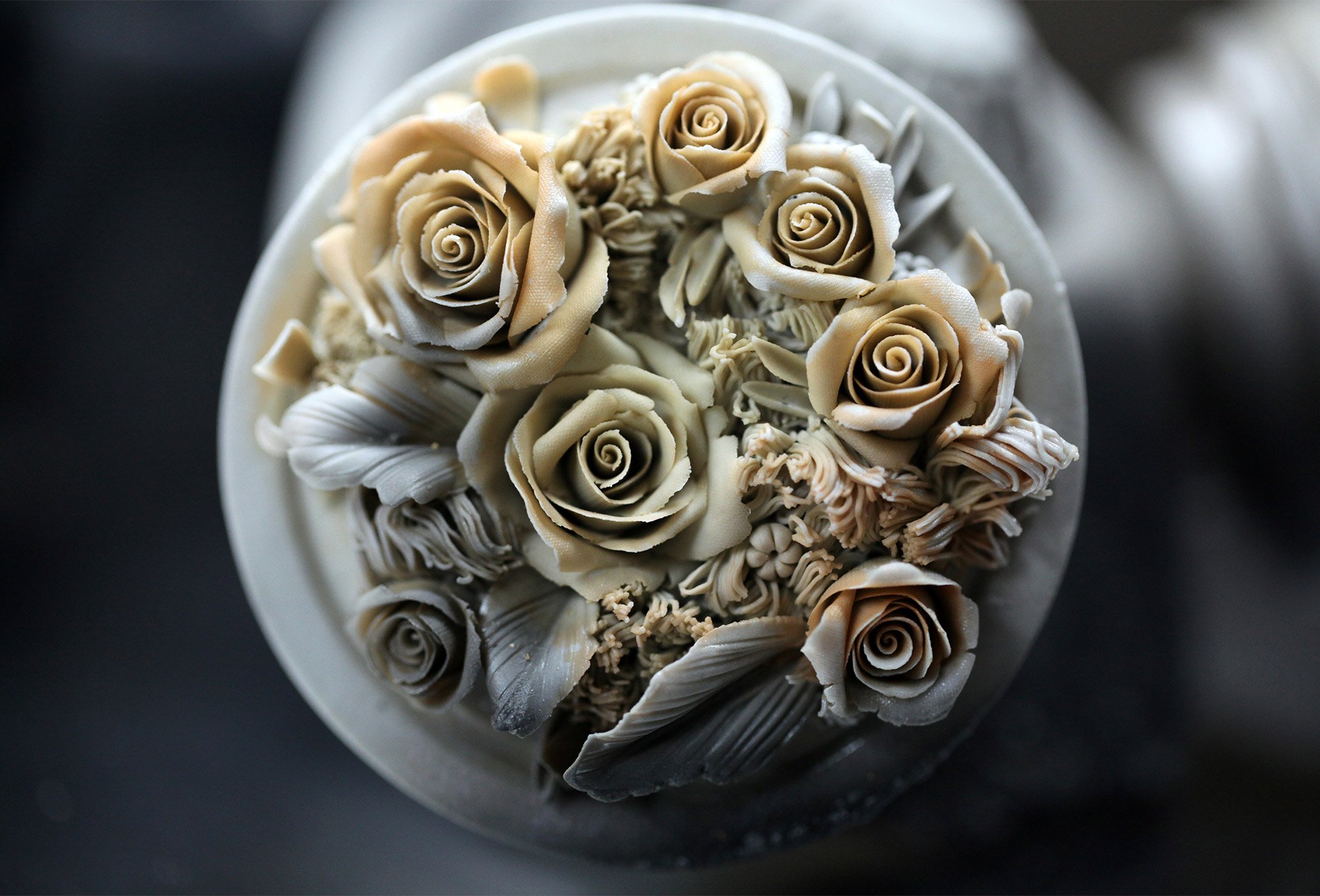Noemi Iglesas Barrios
Noemi Iglesias is a multidisciplinary artist and researcher working with porcelain and long- durational performative formats. Her practice is concerned with the role of visual arts at the intersections of experimental disciplines such as sculpture and digital technologies, using traditional ceramics techniques to generate innovative and provocative concepts within the contemporary art scene. Her work, aesthetically beautiful and attractive, is focused on the production of porcelain and new media installations to report how emotional experiences, such as falling in love, are influenced by consumerist strategies.
Noemi is a natural observer of human behaviour in different contexts and cultures and a clear example of what we call “contemporary nomadism”. Since 2009 the artist has lived and worked in Greece, England, Finland, Italy, Hungary, China, and Korea.
“The technique of ceramic floral production is an industrial job that was entirely performed by women throughout the nineteenth and twentieth century in European ceramic factories.
In a hierarchically patriarchal framework, such as the industrial environment, female presence has always been a clear example of labor segregation that resulted in wage inferiority and therefore an economic dependence on women with respect to male workers.
In my work, I reproduce this floral industrial technique to outline the current commodification of falling in love and how emotional patterns are socially assumed as comercial icons in the production of a romantic utopia where sentimental experiences are presented through specific products manufactured by the industry and transforming emotional patterns into consumerist strategies.” Noemi Iglesias.
Everlasting: Consumerist society is the one whose economy is defined by the purchasing and spending power of the consumers, focused on how happiness is realised through the ownership of personal property. Within this context, romantic love is an intimate and important part of the model, emerging with the rise of the mass market and transforming emotions into commercial strategies.
Emotional patterns have been socially assumed as icons of consumption in the production of a romantic utopia where sentimental experiences are presented through manufactured items made by specific industries.Let’s do a quick test: If we typewriting “wedding car” on google, 851.000.000 entries will appear in about 0,50 seconds. Although this wide offer of romantic artefacts does not control the entire spectrum of intimate relationships, directly or indirectly, have throughly permeated our imagination: It is important to spend money to be loveable.
Everlasting has been produced at the Gimhae Clayarch Museum in Korea as a limited edition of porcelain wedding cars. The model, a 67 Ford Mustang, was initially conceived to satisfy the desire of the consumer, not the necessity. Each car was altered by cutting the doors, raising the hood, or simply distorting the image with an exaggerated flower decoration to open a new perspective from where to rethink and question the establishment of the economic cultural romance.
Quarantine: is a long-term performative experiment that researches into the patterns of the standard emotional behaviour hinted by the use of geosocial dating applications such as Tinder. The application is considered one of the most important in the current digital market allowing communication between people based on their preferences to chat and date. These dates are organised in a structured market where each individual is exhibited through a profile in a catalog of products ready for an immediate use.
Tinder is based on a technology of presumptions about how to understand the self and how to build a sociability through emotional compatibility. It is a very demanding format that plays by forcing an emotional behaviour guided by an algorithmic computation that presupposes our preferences but that has nothing to do with the way we really feel.
The apparently endless freedom of choices promoted by the application, goes together with an excessive narcissism that generates a totally staggered and hierarchical system where love is understood as an hedonistic object of easy consumption. It seems that in a context of unlimited possibilities, love is not possible, and the only skill that is acquired in the whole process is to quickly finish so as to start all over again from the beginning.
BIO
Noemi Iglesias (Spain, 1987).
She is Visual artist graduated if the University of the Basque Country Fine Arts, Bilbao (2010) with a MA in Ceramics of Tainan National University of the Arts, Taiwán (2019) and a PhD in Sculpture and Ceramics of Universidade Belas Artes, Lisboa (2021/2024).
She has held various individual exhibitions such as: “Love me Fast”, Thyssen-Bornemisza National Museum, Spain (2024); “Landscapes of Affection”, Fine Arts Museum Asturias, Spain (2024); “Bling Bling Romance”, Abierto Valencia, Spain (2022); “Not all that glitters, Museo Antón de Escultura, Spain (2021); “Quarantine”, Zaha Hadid building - Me Hotel, Dubai (2021); “Off Love”, Laboral Centro de Arte y Creación Industrial, Spain (2020); “Quarantine”, Gallery 201 at the Tainan National University of the Arts, Taiwan (2019); “Emotional Rescue”, Laboral Art and Industrial Creation Center, Spain (2018); “N & N”, Art Athina Platform Project, Greece (2016); “Late at Night”, Kapolna Gallery. Hungary (2014); “Meriñán”, Montehermoso Cultural Center., Spain (2010); among others.
Noemi Iglesias has participated in various group exhibitions such as “Navigating the digital realm”, DG Connect European Headquarters, Brussels (2022); “Techno Romance”, Electron Festival. Geneve (2022); “Mining the Borders”, Oslo National Academy of the Arts - KHIO, Norway (2022); “Swip Right! Data, Dating, Desire”, iMAL Center for digital Cultures, Belgium (2021); “Un relato polifónico”, Sala 2 Antiguo Instituto Jovellanos, Spain (2021);
“Sense of Women”, Me Dubai Zaha Hadid Opus Tower, UAE (2021); “Inside the white cube”, Taipei Museum of Contemporary Art, Taiwan (2017); “San Claudio, In memoriam” , Oviedo Archeological Museum, Spain (2017); “Re-Action Pants”, Cornwall Autonomous Zone. UK (2013); “The sacred rock project”, ISBA Besançon, France (2013); among others.
Her work is in the collections of Museum of Contemporary Spanish Engraving, the Unicaja Foundation, Los Bragales Art Collection, Gimhae Clayarch Museum, Arte Al Límite Collection, Studiolo Candela Alvarez Collection, Arctic Ceramics Center and other Private Collections.

























